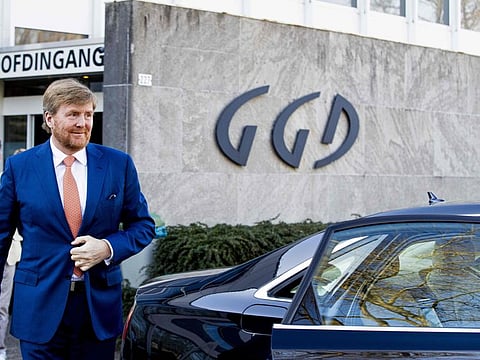Why the Dutch king said sorry to Indonesia
The apology finally turns the page on an ugly chapter of Holland's history

In the midst of all of the news about coronavirus, how different nations were coping, how so many were dying, a sliver of significant news from Indonesia slipped through the cracks of most news outlets around the world.
For all of those who live in that nation of islands that that is the fourth most populous place on the planet, the visit of King Willem-Alexander of the Netherlands was a cause of celebration — not for ceremonial reasons but for the fact that the Dutch monarch apologised for his country’s aggression during its years as the colonial ruler there.
The state visit was the first time the King of the Netherlands had visited Indonesia — a land that was ruled by the Dutch for some 350 years. And like all episodes of colonisation, the Indonesians suffered under Dutch brutality.
As far as Jakarta was concerned, the words had to come from the monarch — which is what happened last week
In Holland, many Dutch would rather overlook their long history of colonisation — and they are not alone. The Belgians, Portuguese, Spanish, French, Italians and Germans in previous guises all held colonies around the world — and none could claim a mantle of being benevolent rulers.
And then there’s the British, who ruled a quarter of the globe at one stage. What’s interesting is that a recent poll in the UK in the past month found that some 52 per cent of Britons believed that the lands they colonised were better off under British rule.
No one has taken a survey of what those various peoples stretching from Hong Kong to Canada, New Zealand to South Africa, Sri Lanka, India, Pakistan, Bangladesh and the rest of the former imperial lands thought about their British rulers.
But in The Hague, the quaint seaside capital of the Netherlands, a court was passing its verdict too on one more recent episode of Dutch colonisation.
Colonial history
When Andi Monji was 10 years old, he was forced to watch his father’s summary beating and execution by a Dutch soldier in South Sulawesi as the colonisers attempted to re-assert their control over Indonesia in the months after the Second World War.
The Dutch East Indies fell to the Imperial Japanese Army as it swept south and west across much of Asia during 1940. Japan occupied the territory — a vital source of rubber and other materials essential to its war effort in the Pacific. After Japan’s surrender, the nationalist leaders Sukarno and Hatta proclaimed the Republic of Indonesia on 17 August 1945.
Naturally, the Dutch also just recently liberated from five years of Nazi German rule, were having none of it. They sent troops to stamp out the independence movement.
Monji, now 83-years old, travelled to the Dutch capital to have his day in court and accept a judicial award of €10,000 (Dh40,243). He was accompanied by eight widows of other men summarily executed by Dutch soldiers. There children of victims were also there. The court awarded them compensation ranging from €123.48 and €3,634 for loss of income.
Monji’s father was killed at the end of January 1947 in the village of Suppa. Sadly, it wasn’t a one-off event, and more than 200 village men are believed to have died in that one incident alone.
Also Read: Turning the clock back on coronavirus
Also Read: Coronavirus: Reach out and show you care
Too long ago
For its part the Dutch state had argued that the cases should have been thrown out of court because they happened too long ago in the past.
It’s an interesting argument given that pretty much at the same time, King Willem-Alexander was making his speech of apology in front of Indonesia’s Prime Minister Joko Widodo and his wife, Iriana, at an official ceremony in the ornate colonial-style presidential palace in Bogor, just outside the capital, Jakarta.
The monarch’s apology is the latest in a series that have been issued by the Netherlands over the past seven years. After 350 years of colonial rule, the first words of apology came from the Dutch ambassador to Indonesia in 2013.
He expressed remorse then for a series of massacres carried out by the Dutch military to crush resistance against colonial rule in Java and Sulawesi islands after that August 1945 declaration of independence. Even then, that apology came only after the victims’ widows took the Dutch government to court.
For more than four years, Dutch military forces tried to put down the nationalist movement, only finally recognising Indonesia as an independent nation in December 1949.
Mindless killing
Some sources put the number of Indonesian dead during the struggle at 150,000 while roughly 1,500 Dutch soldiers were killed.
The 2013 apology by the Dutch ambassador was a start, paving the way for a Dutch trade mission there months later.
But for many Indonesians who lost relatives in the bitter independence struggle, ‘sorry’ from an ambassador wasn’t good enough: They wanted to hear it from the Dutch monarch.
Last year, Prime Minister Mark Rutte also uttered words of apology. As far as Jakarta was concerned, the words had to come from the monarch — which is what happened last week.
“In line with the previous statement by my government, I would like to express my regret and apologise here for the excessive violence on the part of the Dutch in those years,” the king said at a joint news conference. “I do so with full awareness that the pain and sorrow of the affected families will be felt for generations.”
Maybe now both nations can turn the page on this ugly chapter of history.
Mick O’Reilly is the Gulf News Foreign Correspondent based in Europe
Sign up for the Daily Briefing
Get the latest news and updates straight to your inbox


